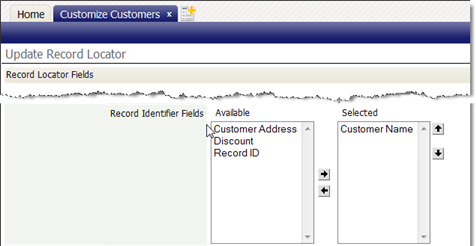Difference between revisions of "Record Identifier"
imported>Aeric |
imported>Aeric |
||
| Line 16: | Line 16: | ||
====Fields Available for Use as Record Identifiers==== | ====Fields Available for Use as Record Identifiers==== | ||
In general, fields that are available for use as record identifiers resolve to a single alphanumeric value of moderate size. | In general, fields that are available for use as record identifiers resolve to a single alphanumeric value of moderate size. | ||
One [[Lookup]] field may be specified. | |||
These fields cannot be used: | |||
:{| | :{| | ||
| | | | ||
:* File | :* File | ||
:* Image | :* Image | ||
:* | :* Text Area | ||
| | | | ||
:* Custom Control | :* Custom Control | ||
:* | :* Url | ||
:* Rich Text Area | |||
|} | |} | ||
Revision as of 19:33, 9 September 2011
Designer > Data > Objects > {object} > [Record Locators] > Record Identifier Fields
A Record Identifier consists of one or more fields that are displayed when a record has been selected. (When multiple fields are specified, their values are separated by hyphens and displayed as the value of a Lookup field.)
About Record Identifiers
Ideally, a Record Identifier unique label that distinguishes one record from another (although it need not be). These labels can be seen in Views and Records.
- When a new object is created, the first three fields defined in the object are used to form the default Record Identifier. The Record Identifier can be changed at any time.
Example
In this example, the Customer object specifies the customer_name field might as the Record Identifier. When the customer has been selected in a Lookup, the customer_name field is displayed to indicate which record was chosen.
Fields Available for Use as Record Identifiers
In general, fields that are available for use as record identifiers resolve to a single alphanumeric value of moderate size.
One Lookup field may be specified.
These fields cannot be used:
- File
- Image
- Text Area
- Custom Control
- Url
- Rich Text Area
